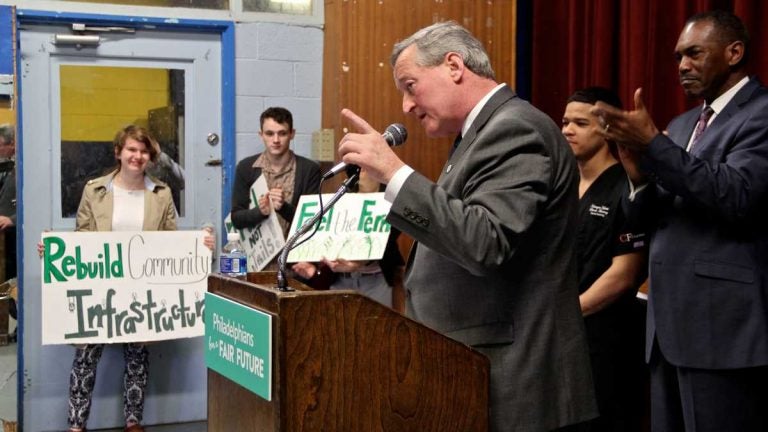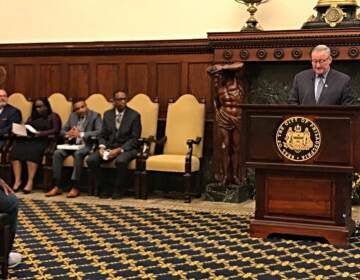Philadelphia Council introduces bill to phase out soda tax
A bill introduced by City Councilwoman María Quiñones-Sánchez at a City Council meeting on Thursday would gradually phase out a portion of the tax on sweetened beverages.

Mayor Kenney pitches sugary drink tax as key for his Pre-K and Rebuild initiatives, March 2016 (Emma Lee / WHYY)
This article originally appeared on PlanPhilly.
—
Updated: 3:27 p.m.
Philadelphia Mayor Jim Kenney just got handed a new and potentially dire challenge to the city’s soda tax — the signature achievement of his first term.
A bill introduced by City Councilwoman María Quiñones-Sánchez at a City Council meeting on Thursday would gradually phase out a portion of the tax on sweetened beverages through 2021. The bill lacks specific numbers, so it could phase out the tax entirely or just reduce it.
The bill is the most serious challenge to hit the levy on sugary drinks since it survived a legal challenge from the beverage industry in 2018.
Kenney whipped council support for the 1.5 cent-per-ounce tax in 2016 as a funding vehicle for his mayoral agenda, which includes programs like subsidized pre-K and the public works program known as Rebuild. But the policy also drew the ire of the powerful beverage industry, which is still spending millions to kill the tax.
While the specifics of the legislation remain murky, the breadth of support is clear. All three Republican council members — Brian O’Neill, David Oh, and Al Taubenberger — support the bill, along with Democrats Cindy Bass, Blondell Reynolds Brown and Allan Domb.
“I think everyone in council is in favor of the programs, pre-K and Rebuild,” said Domb, of the phase-out bill. “But I think in my personal opinion, broad-based initiatives, like pre-K and Rebuild should be paid for by a broad-based tax, not a narrow tax.”
A separate resolution introduced Thursday calls for a study of how the tax affects city businesses.
“I believe a study of it is good. That’s the place to start,” said O’Neill. “Let’s see what the effect has been; the effect on business, the effect on Rebuild and pre-K. And we’ll go from there. It’s always the right time to have hearings and not just turn your back on it.”
Beverage industry spokesman Anthony Campisi praised the bill and sought to link the tax to the closure of a local supermarket.
“We appreciate that these councilmembers recognize that the beverage tax is a harmful policy. However, we don’t need a study to know that the tax hurts working families across Philadelphia and should be repealed,” he said. “This tax has cost hundreds of job and caused the closure of one West Philadelphia grocery store – which closed its doors for the final time this morning.”
Quiñones-Sánchez’s 7th Council District includes a soda bottling facility and the Councilwoman has opposed the tax historically. She said that her bill is an attempt to understand and address any unintended impacts of the soda tax on vulnerable Philadelphians.
“This is not a repeal…it’s just saying that we’re going to have a study and we’re committed to looking at any unintended consequences and something will be done,” Quiñones-Sánchez.
The sheer number of co-sponsors makes the bill the strongest legislative challenge to the tax. The beverage industry has succeeded in repealing similar taxes in other cities, like Chicago. However, the bill starts out just two votes shy of the nine votes needed to clear the chamber. And they would need 12 votes to override a mayoral veto.
Kevin Feeley, who represents a coalition of interests who support the soda tax, noted that the legislation is silent on how programs funded with these revenues would be funded.
“We weren’t surprised by the introduction of the bill. The industry has been advocating for this for three years,” he said. “But the beverage tax funds programs that are vital to Philadelphia’s future. So, we look forward to the public debate and hearing how opponents explain how they plan to fund these programs without it.”
Legislation outlining the new study suggests that a fee on single-use plastic bags, like those used at supermarkets and corner stores, could be used as an alternative funding source.
This is a developing news story and will be updated as more information becomes available.
WHYY is your source for fact-based, in-depth journalism and information. As a nonprofit organization, we rely on financial support from readers like you. Please give today.







